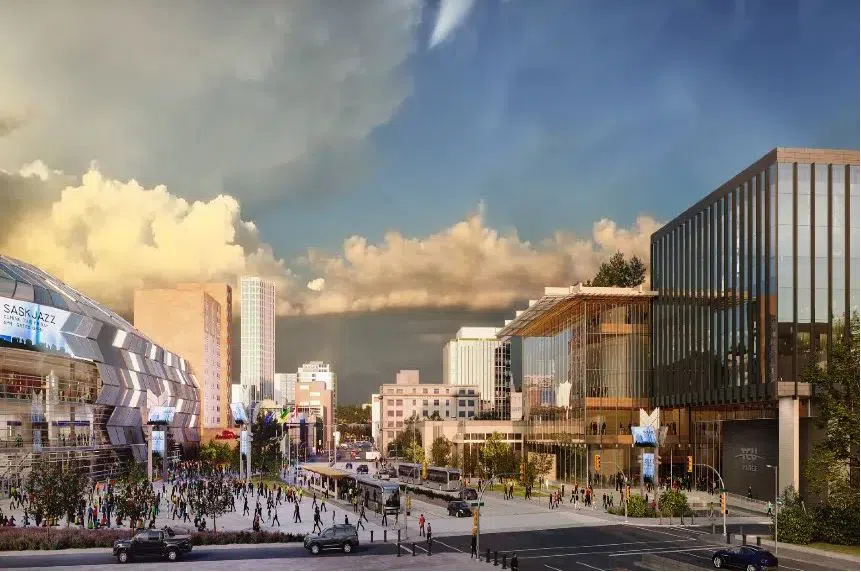Saskatoon city council voted to proceed with a proposed funding strategy for a brand new arena and entertainment district.
Last week, the city announced the district would cost an estimated $1.22 billion, without raising property taxes.
Instead, the money would come through an accommodation tax, amusement tax, parkade revenues, possible funding from provincial and federal levels, and a private investor in OVG360.
While there is a proposed plan on paper, council voted to continue the conversations surrounding the current payment plan structure — there are still many conversations to do before a master plan can be developed and signed to get shovels in the ground.
In the recommendations presented to council, it approved to continue seeking additional revenue sources and project savings, along with the intent to fortify the city’s ability to fund the project with no property tax increase and reduce the financial reliance on the accommodation industry and amusement tax revenue streams.
One area where funding talks will continue is from those working in the accommodation sector.
Several members representing hotels throughout the city were at council on Wednesday voicing their displeasure over the proposed 5.9 per cent increase towards the accommodation tax to help pay for the proposed new arena.
“The primary purpose of this accommodation tax when it was rolled out in various cities throughout North America was to support initiatives which attracts tourists and visitors to the city,” said Renjith Vengalil, who was representing Saskatoon’s Delta hotels.
“Implementing a high accommodation tax would put Saskatoon at a competitive disadvantage, particularly in attracting major conferences and events. A proposed tax of 5.9 per cent would be the highest in the country and be a clear deterrent to event planners,” Vengalil added. “One of the primary reasons noted for our turn downs currently is price sensitivity and adding on additional taxes will only cause an additional hurdle for this.”
An artist rendering showing a proposed downtown arena and Bus Rapid Transit (Supplied/City of Saskatoon)
Vengalil said he supports Saskatoon trying to build a new arena, but reiterated that the city can’t proceed with this funding model for hotels.
“A collaborative approach will ensure that our industry concerns are addressed and that the final funding model is fair and credible to all parties involved,” he added.
Paul Rosten is with D3H Hotels – a company founded in Saskatoon which manages hotels throughout Saskatchewan and Alberta.
He supports the arena project, but also sounded off on the tax and the threat it poses to the local hotel industry.
“Approving this funding model on hotels would burn the Saskatoon hotels with one of if not the highest combined tax rates in the country, despite the fact that Saskatoon has one of the lowest average daily rates we can charge for any major Canadian city,” Rosten stated.
“For our hotel if this funding model were to progress and understanding the cities willingness to apply a hotel subclass tax, we’re facing an 80 per cent increase in our municipal taxes, which is untenable,” Rosten added. “I simply cannot fathom how this model is expecting the hotel industry to contribute more than $200 million to DEED (Downtown Entertainment and Event District), which is more than ten times of what’s being asked of an upfront contribution from a private operating partner.”
Steph Clovechok is the CEO of Discover Saskatoon also isn’t a fan of the proposed increase.
“The proposed 5.9 per cent accommodation tax presents significant risks. Over the past eight years, we have lost over 100 bids (for events) due to price sensitivity. A higher tax rate could further deter event organizers and lead to the loss of other opportunities,” she explained.
Discussions still need to be had and the city still needs to meet with OVG360 about their possible commitment to the project.












